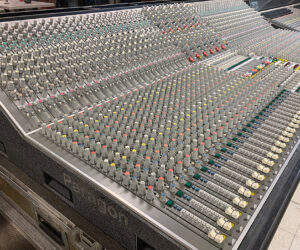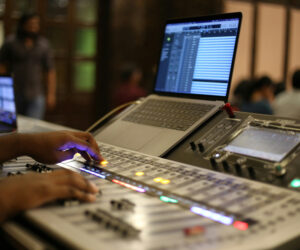This post grew out of a breakout session at a Willow Creek Arts Conference a few years ago.
The session was titled “Thriving at Front of House,” and speakers included Robert Scovill, Chris Gille and Scott Ragsdale. I give Scovi credit in advance for much of the content herein.
As usual, it will be interspersed with my thoughts and commentary.
I hear from younger sound guys (an occasionally older ones) that they don’t get no respect (with apologies to Mr. Dangerfield) from musicians, their pastor or the church leadership.
Sometimes that’s due to ignorance or egos, but sometimes it’s because the engineer in question (brace yourself for some potentially hard words here) doesn’t deserve the respect he or she things is due.
With the incendiary comments out of the way, let’s unpack that.
Scovill talked a lot about your “Credibility Score.” That looks a lot like credit score and it’s something you should take just as seriously. He talked about some guys who are consistently able to get gigs that they may not be the best qualified for simply because they built up such a reputation for being credible.
Others manage to keep gigs they shouldn’t based strictly on talent because they are credible. Just like a credit score, you earn points for consistently being prepared and staying ahead of the game. The more you do that, the higher your score. Then when you need to speak truth into a situation, people will listen to you. If you come off like a know-it-all punk, well, you know the reaction.
Here’s the deal: We teach people how to treat us.
It seems counter-intuitive, right? We all know that we like to be treated with respect. However, we often teach people that we are not worthy of respect because of the way we behave. If we are consistently late, or don’t fix problems quickly or are unprepared, others won’t take us seriously—mainly because we don’t take our own role seriously!
You’ve heard it said, “God is in the details,” so why do we get so lax about doing sound in church because, “It’s only church.” This is entirely the wrong attitude! Our church gigs should be our best gigs because they’re for the King of Kings.
Texting when you should be mixing won’t help win points with the worship team. Making the band wait while you figure out which mic to plug into which channel won’t endear you to the band leader. Updating your Facebook status while the pastors mic is ringing will not set you up as a credible authority on live sound.
Now with this food for thought laid out there for feasting, let’s look at specific ways we can raise our credibility score. Following even a few of these ideas will go a long way in making your life easier at front of house.
The worship leader and band will respect you more and it may even make you more popular with the ladies (or maybe not…).
Let’s consider a few specific things that you can do to raise your credibility score.
Always be the first one there. If you’re early, you’re on time; if you’re on time, you’re late. Being there early gives you the chance to pre-set the stage, and get as much wired ahead of time as possible.
Doing this will make sure the musicians aren’t waiting around for you to get ready. No one likes having their time wasted, and seeing you prepared and ready for them will deposit some valuable currency in your bank (I’m speaking metaphorically here…).
Strive to be a communicator. Being a front of house engineer is a lot more than just mixing. You need to be able to speak the language of musicians, worship leaders and even administrators.
If you try to tell church leadership that the reason the sound is bad is because “the Rev 60 time is like, 3.5 seconds, and the mains are behind the front fills by 45 milliseconds and the subs are out of phase with respect to the mains,” you’re likely to encounter a glaze thicker than that on a Honey-baked ham.
If the worship leader informs you that there will be a guitar solo four bars into the bridge and you think a bar is where the “sinners” are instead of at church and a bridge gets you across a body of water, you’re in deep weeds.
Sometimes, the best way to fix a musician’s monitor mix is to go up on stage and stand next to him (or her) and engage them, finding out what they are hearing and what they need to hear instead. As you listen to them talk, and to the mix, you should be able to figure out how to fix it. Sometimes simply the act of caring will solve the problem.
Be accountable—own your mistakes. Let’s get this out on the table right now: We all make mistakes. I’ve mixed hundreds of services and I still occasionally hit the wrong button and unmute the wrong channel. At the debrief, the worst thing you can do is pretend the pastor’s mic wasn’t on (because they will likely start fumbling for it when they realize they’re not on).
The best response is to say, “Oh, that was totally my bad. Sorry about that.” That will pay huge dividends; especially when the pastor does walk on stage with their pack off.
Avoid making decisions that are driven purely by criticism. If you have a good mix going, don’t turn the guitar down just because someone walks up and says it’s too loud. Take pride in what you do. We are artists, just as much as everyone on stage is an artist. Listen to the criticism, but you don’t always have to react to it.
Develop into a detail-oriented pro. This is one of my favorites because I’m such a detail freak. Make up stage plots and input lists—ahead of time. Make sure the wireless gear is full of fresh batteries when everyone gets there. Pay attention to the way the worship leader likes their mic stand and set it that way every time. Take notes during rehearsal and hit your cues.
Finally, bringing up the guitar just as he finishes his solo (because you forgot there was a solo and you couldn’t find the right fader fast enough) will not score points. Forgetting to open the video channel for the video roll is not a way to impress the video team (or anyone else). If you take what you’re are doing seriously, people will take you seriously.
Mix like a pro, listen like a fan. I’ve never thought quite in these terms before, but I’m indebted to Scovill for this phrase. Once you get your mix put together, go out in the house and listen. If you were a fan of this band, would you like the mix? Does it make you want to stand up and say “Yeah!” If not, get back to work. Of course, if the band isn’t very good… well, that’s another post.
So there you have a few ideas on how to raise your credibility score. Again props to Robert Scovill for the basic concept of this post. Thank you sir for sharing your wisdom…





















